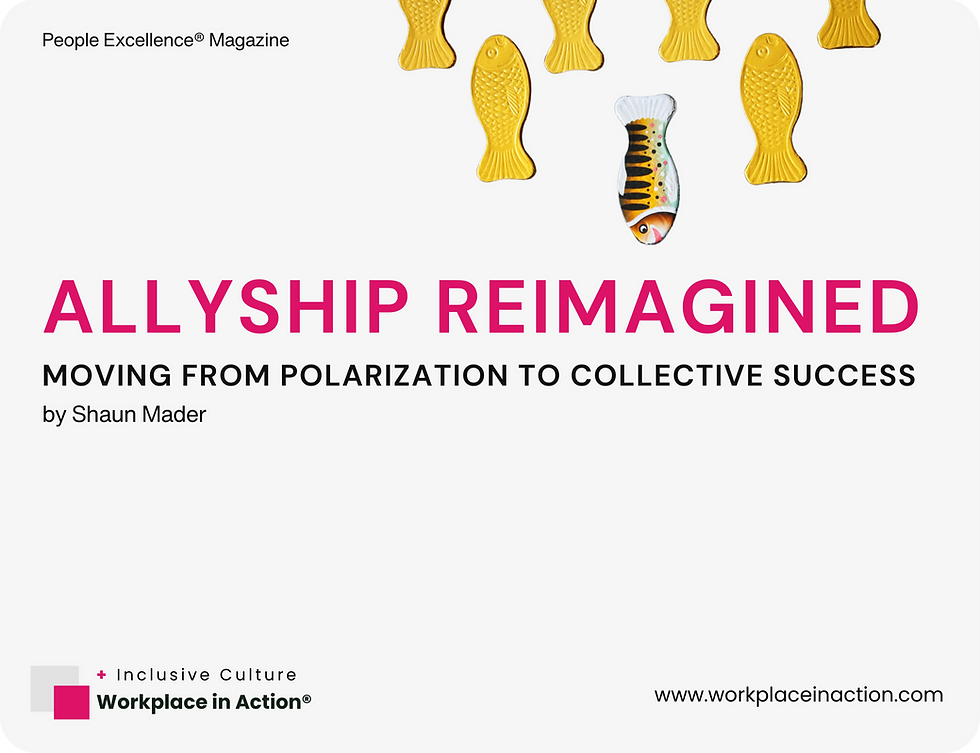Enhancing Global Financial Credibility Through Structured DEI Management
- May 24, 2024
- 5 min read
Updated: Nov 9, 2024
This is our article published by HR Magazine in the May 2024 issue.
Global and local economic developments and the search for financial support have been reshaped by current needs, and the standards established to access these resources have changed in parallel. Sustainability reporting, which has become mandatory in different countries as of the first day of 2024, has paved the way for companies to be examined and evaluated holistically, not only regarding their financial situations, with the successive regulations issued by the EU.

"We support businesses in enhancing their global financial credibility by implementing structured DEI management."
Baki Can Feyiz
TDX Consulting - CEO
Among these evaluations, the title of Diversity, Equity and Inclusion (DEI) has opened a new opportunity area that allows companies to get ahead of their competitors with minimal investment in the short term and achieve high scores in relevant financial evaluations.
The fact that sustainability is not only considered as "green and environment" but also includes "people and culture" by expanding its meaning has enabled companies to take deeper and longer-term steps when determining their strategies. Thus, a production model that is stronger locally, self-sufficient and spreads this over the long term has begun to be truly supported. In this way, instead of companies that suddenly shine and fade away, this model, which grows step by step and supports its environment in terms of both humans and nature, attracts the attention of companies that receive financial resources more than others. It is aimed to overcome the crises caused by the failure to pay the previously received loans and supports, and measures have been taken to ensure that the allocated resources are used as they should be in a way that supports growth and development. One of the most important actions the relevant financial institutions took in this direction was to ensure the return of financing by taking the DEI and Sustainability topics more seriously when evaluating companies. Thus, preventing market disruption and supporting those affected by this disruption has become a priority.
It was envisaged that social welfare would increase in this way, as emphasized by the EU, and it was aimed to transform third countries that are party to trade with similar regulations. In this transformation, some regulations have been made mandatory, thus strengthening trade and reducing consequences such as inflation with a more robust supply chain. Putting human-related regulations into action that will yield results as quickly as possible has become a priority and DEI has become a global agenda. While many topics have been brought to the agenda within the scope of DEI, the empowerment of women, which is currently followed, has become even more important. In this context, leaving half of society behind in business life prevents opportunities that could increase global trade volume and production. It is predicted that global production and trade volume will increase by approximately 35% by preventing losses, empowering women and increasing their employment. Such growth will positively affect the lives of many people and open new doors where companies can achieve their financial goals with a small investment.
Of course, in addition to all these financial returns, companies' involvement in such activities with a high social responsibility impact both increases their brand value and positively affects employee loyalty. It is a well-known fact that the brand image of companies that take action rather than companies that support them is more appreciated by society.
DEI, which has become one of the issues that established companies within the EU and companies exporting to the EU should pay attention to, has become an essential topic that companies must address as an inevitable result of the increasing need for financing recently. So much so that Australia, New Zealand, and Canada have also made similar regulations regarding their supply chain, company sustainability, and DEI.
To elaborate further, the most important issue for providing the relevant financing is the certainty of repayment of this support. In this context, DEI spreads the risks and seriously reduces non-positive returns by evaluating the actions taken in various ways with the different perspectives it brings to companies. The tendency of managers to prefer people "similar to themselves" in recruitment is eliminated, and decisions made by different people with the same perspective are prevented. At the same time, it ensures that other decisions taken by the people filling the relevant positions are implemented professionally, free of personal biases, as much as possible. As we all know, positive or negative prejudices and parallel unrealistic expectations cause financial difficulties and undesirable results in the use of resources. As we have seen or heard, many "projects" cannot achieve their results this way and cause losses that companies do not want.
Of course, this internal similarity and monotony not only causes losses in making ordinary managerial and administrative decisions but also seriously reduces the competitiveness of companies by blocking the way for innovative thinking. It is not very difficult to say that a company whose target audience is women, but where most of its intermediate staff and management are men, has a structure that does not fully understand the product it produces or does not know its soul in its simplest form. Although some points have been learned due to knowledge and experience, it does not seem far away that the company will face governance losses and fall behind in the competition, as innovation requires a more diverse and comprehensive approach. This situation reveals the missed opportunities as an example given only through the male-female dilemma. In our world where we wake up to a different day every morning, where the intensity of the day ten years ago is completely different from the intensity of the day ten years ago, the actions we will take for our companies must be more thoughtful and implemented by taking all aspects into consideration.
The current business world is not only fast-paced for companies, it has also accelerated turnover for employees. Managing and trying to reduce the increasing turn over has become one of the priorities and has found a place in the budgets. Considering the investments made in employees with a strategic approach, employee loyalty has become more visible in this topic, which can cause losses if not taken into consideration. As a natural consequence of the positive effects of DEI, it humanizes the working environment and, with the impact it creates, it also seriously affects employee loyalty and creates positive results for the management of the turn over.
DEI is not only critical for internal actions, but also appears as an important topic for the market. By understanding the needs of the customers in the countries where they sell, exporting companies expand their customer base and help them reach their sales targets accordingly. One of the most likely outcomes is that companies that understand their customers better will be ahead of the competition.
When all these advantages are taken into consideration one by one, it is observed that the most important issue for credibility, that is, the probability of repayment, increases significantly. Moreover, it is observed that sustainability and DEI have become an important topic for financial valuations and credibility assessments, and most financier companies require these studies to be carried out as a prerequisite.
Thus, the fact that financing companies make their evaluations by taking this title into consideration adds value to strategic management and people-oriented companies by highlighting them. The existence of a measurable and observable DEI structure based on KPIs and the certificates received as a result of examinations by a third eye provide great support to companies in such credibility processes and increase the financial value of the company.
As Workplace in Action®, we provide intensive support to companies in creating solid and sustainable DEI structures with our DEI application and certification program and turn internal opportunities into financial results.
We look forward to taking the steps to be taken for a people-oriented, sustainable and positive working environment with you.
_edited.png)




Comments